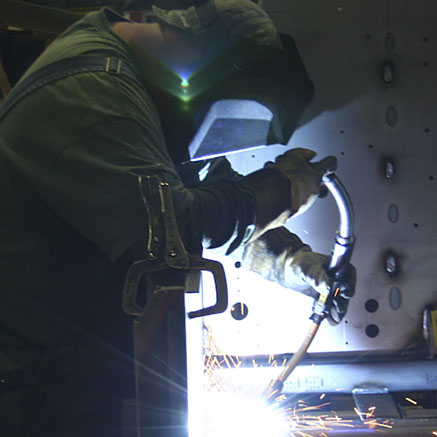
Mechanical and Technical Skills Needed at Area Ag & Automotive Businesses
July 28, 2017
NOTE:This is the first in a four-part series on high-demand jobs in Phelps County. Be sure to read next month’s e-newsletter to find out what other areas careers are “hot” for local job seekers.
High schools students or adult job seekers with an aptitude for mechanics and technology will find plenty of job opportunities right here in Phelps County.
Area employers have at least nine job openings for positions such as automotive or agricultural technicians and diesel mechanics. And, the demand is so high that employers are paying for education, tools and certifications to recruit workers.
Interested students can earn associate’s degrees without racking up college debt and snag a high-paying guaranteed job right out of college as local employers are paying as much as $45,000 a year starting wages. Those salaries can rise to near $100,000 in a few short years for mechanics who are efficient and good at their work.
Dan Janssen, owner of Janssen & Sons Ford in Holdrege, said they are seeking at least one automotive technician at all three local Janssen dealerships and have openings at their locations outside of Holdrege as well.
At Janssen, an automotive technician diagnoses and repairs automotive problems. Ideal candidates, Janssen said, are those who enjoy technology (as most vehicles are run by computers now) and getting their hands dirty making repairs.
The perception that the job is dirty, Janssen said, may be what’s holding some back from this career.
“They are really smart guys,” Janssen said. “But, because they work with their hands and get their hands dirty, there’s perception they are a just a grease monkey.”
And, automotive technician work isn’t just for guys. Janssen currently is training a female student from the Wilcox area who showed an interest in the career.
Christina Borgman is working through the MCAP program at Southeast Community College. She rotates going to school for seven weeks and then working at Janssen’s for seven weeks. When she graduates after two years, she will have an associate’s degree and will be a manufacturer-certified technician.
“Because they are warranty certified, they are more valuable to us, and they can hit the job running the first day,” Janssen said.
Janssen, like other area employers, offers a student-loan reimbursement program where the company makes the students’ educational loan payments as long as they are working for Janssen’s.
Technicians interested in working with farmers and farm equipment also have their share of job opportunities as two local implement dealers have a plethora of job openings.
Steve Barger, Area Product Support Manager at Titan Machinery, said they are looking to hire ag technicians at all three area Titan stores – Holdrege, Lexington and Kearney.
“They are really hard to find,” Barger said. “We have been advertising since March for one and haven’t had but one or two applicants.”
With the advancements in precision agriculture, the job requires more computer skills and training.
“It used to be that you needed a guy with mechanical aptitude who can work on engines and transmissions,” Barger said. “You still need that, but you also need someone who can diagnose, download new software and program machines.”
Barger said they have found the best way to recruit agricultural service technicians is right out of high school.
That’s what they have done with two recent Holdrege graduates – Levi Woodring and Lex Swanson. Titan will pay for the students to earn two-year degrees in diesel technology as long as they work for the company for four years after graduation.
Alex McClymont, After-Market Manager at Landmark Implement, said his company also offers a training program for high school students and educational reimbursement plans. They have 17 openings for ag technicians throughout the company’s branches. Two are needed in Holdrege.
Because of the two-year waiting list for John Deere’s ag tech program in Milford, it’s best if students decide during their junior year of high school if they want to pursue this career path. McClymont said the training is challenging, and typically only one in three students who enters the program graduates.
McClymont said students who successfully complete the program and start working for Landmark are often earning higher salaries than students with four-year degrees and can earn in excess of $70,000 annually after gaining several years of experience.
Landmark also offers a tuition reimbursement program, and like all other area employers, also helps students purchase needed tools for the job. In addition, the working environment and benefits are good. Hours for the job are typically weekdays 8 a.m-5:30 p.m. plus a Saturday rotation with longer hours during planting and harvest. Benefits include health insurance and 401K plans.
Mike Wiser, Manager at South-Central Diesel in Holdrege, said his company pays 100 percent health insurance and offers bonuses, paid vacation and a retirement plan. He’s currently seeking four diesel mechanics to add to the six already on staff.
Work at the shop includes rebuilding diesel pumps and turbo chargers and working on diesel pick-up trucks. Computer skills are also needed as technicians need to be able to read calipers and micrometers. And, candidates must have good handwriting.
Wiser said a two-year degree in diesel technology would be preferred, but they also take qualified candidates with a high-school degree or GED and send them to manufacturer’s training classes, such as Bosch and Denso.
All four area employers said they want to dispel the myth that it takes a four-year degree to have a high-paying career. Jobs in diesel, automotive and ag technology offer high salaries, low to zero college debt thanks to reimbursement programs, and good working conditions. Plus, the jobs can be challenging and rewarding for those with mechanical and technical aptitudes.
Link:
Actor and pitchman Mike Rowe of "Dirty Jobs" recently created a video providing his take on how best to close America's skills gap and the importance of trade schools. Rowe concludes: “The jobs that exist right now don't require massive amounts of debt. They don't require four years of liberal arts study. They require the willingness to learn a skill that is actually in demand.” See the video HERE.







